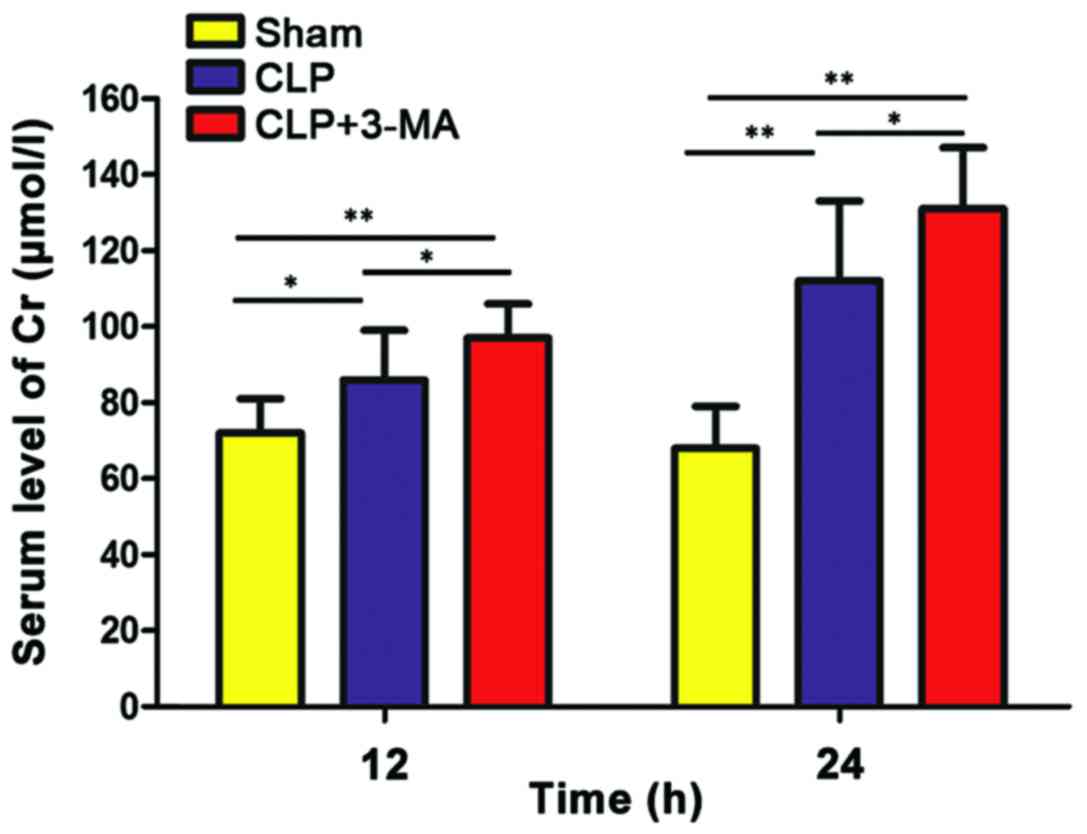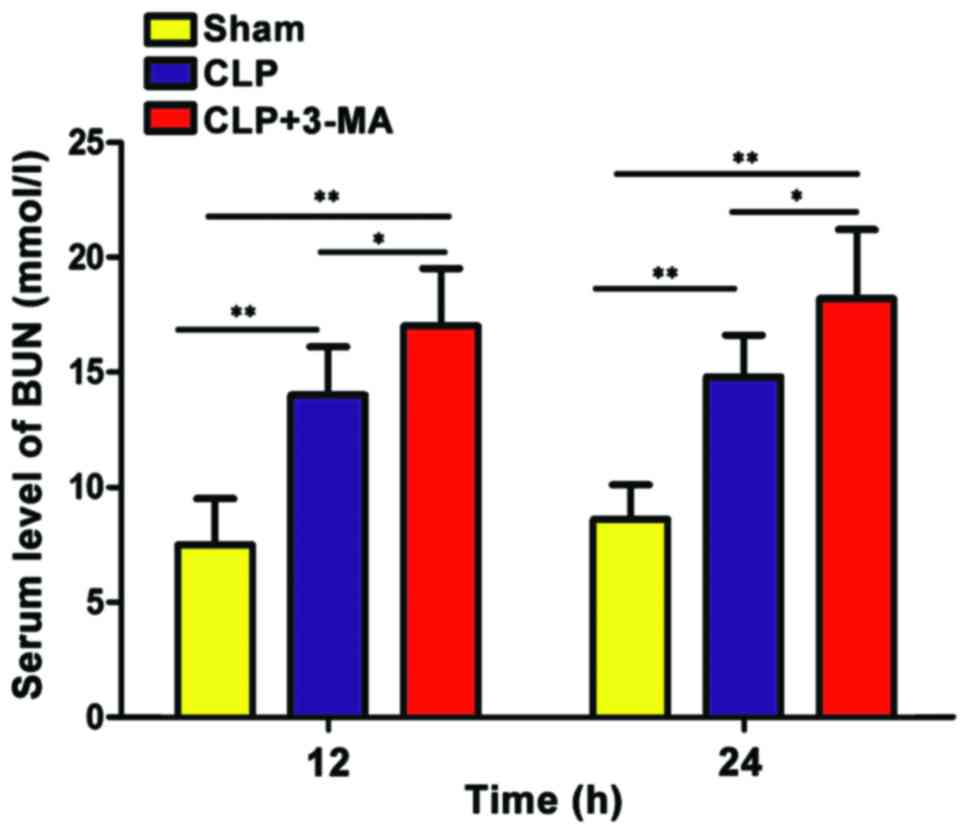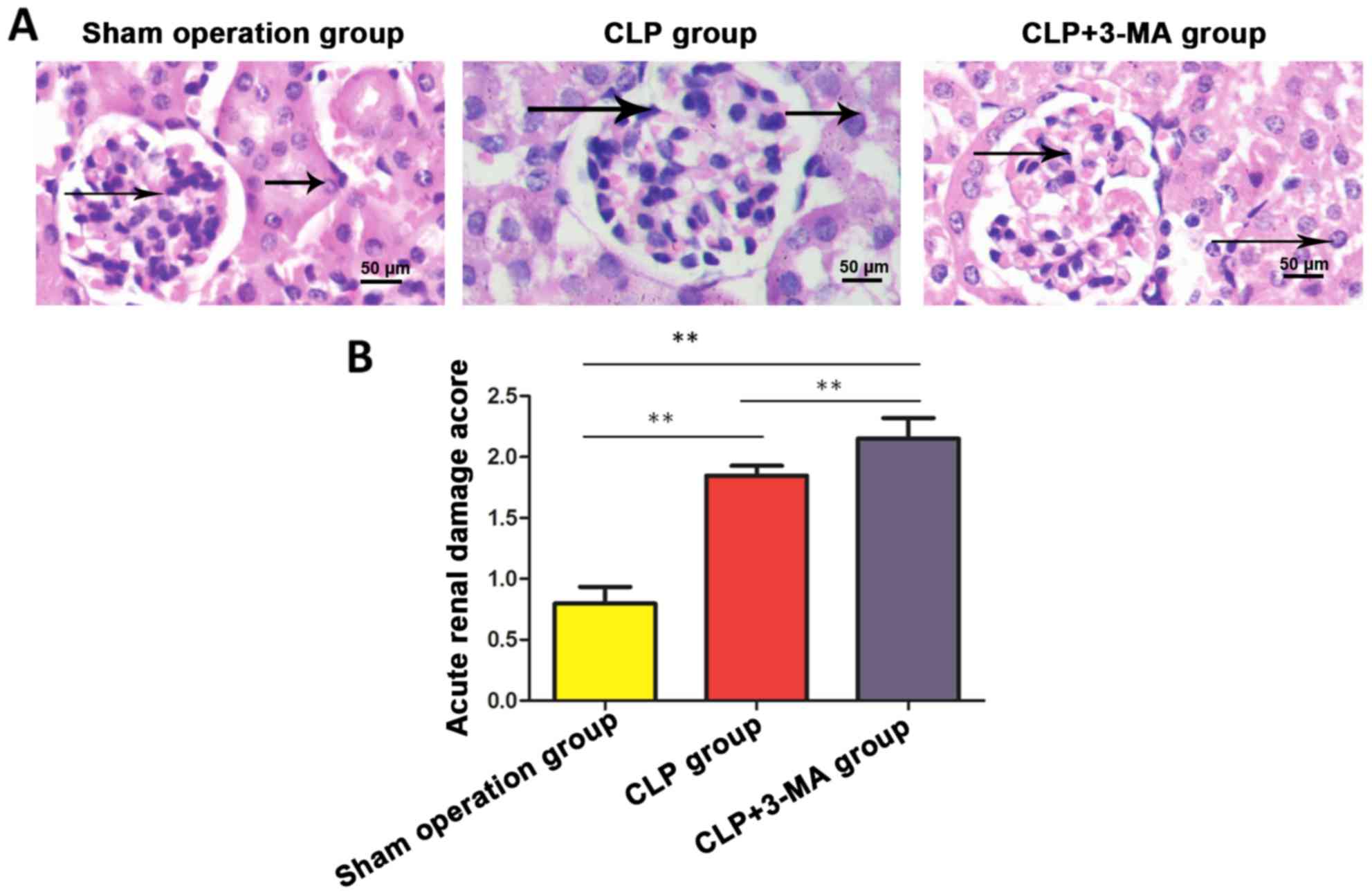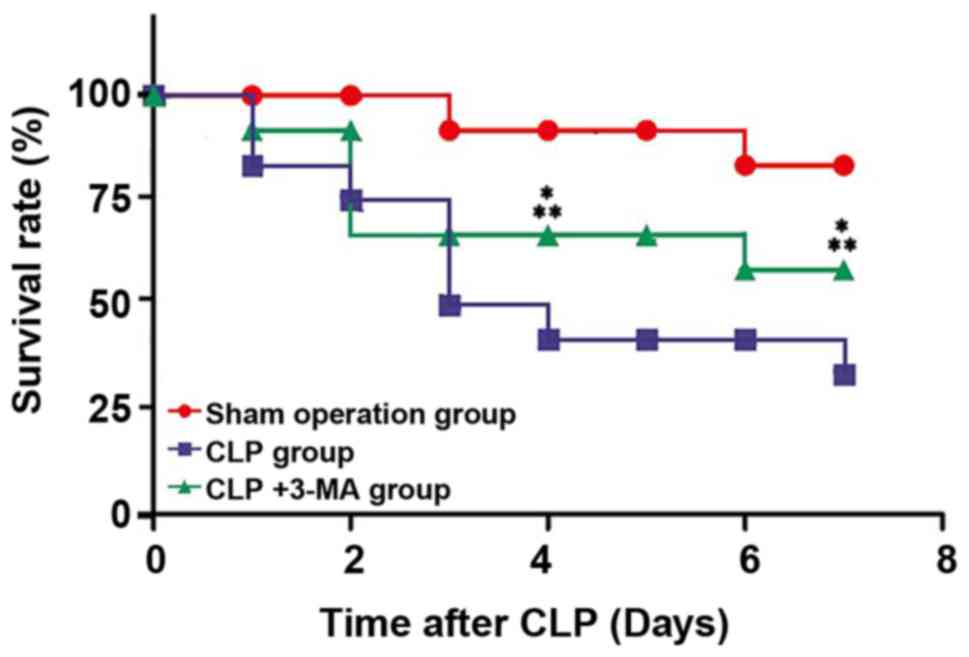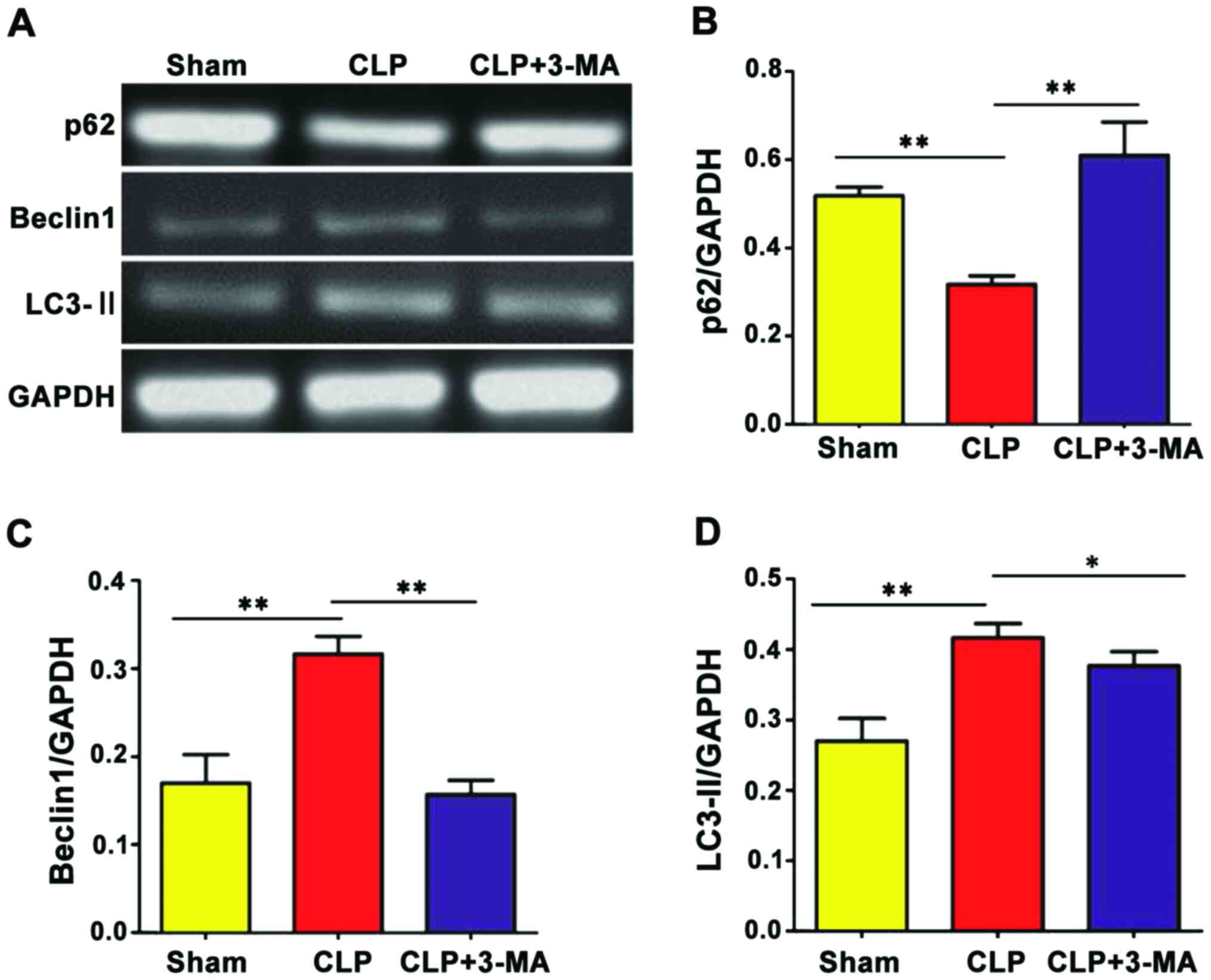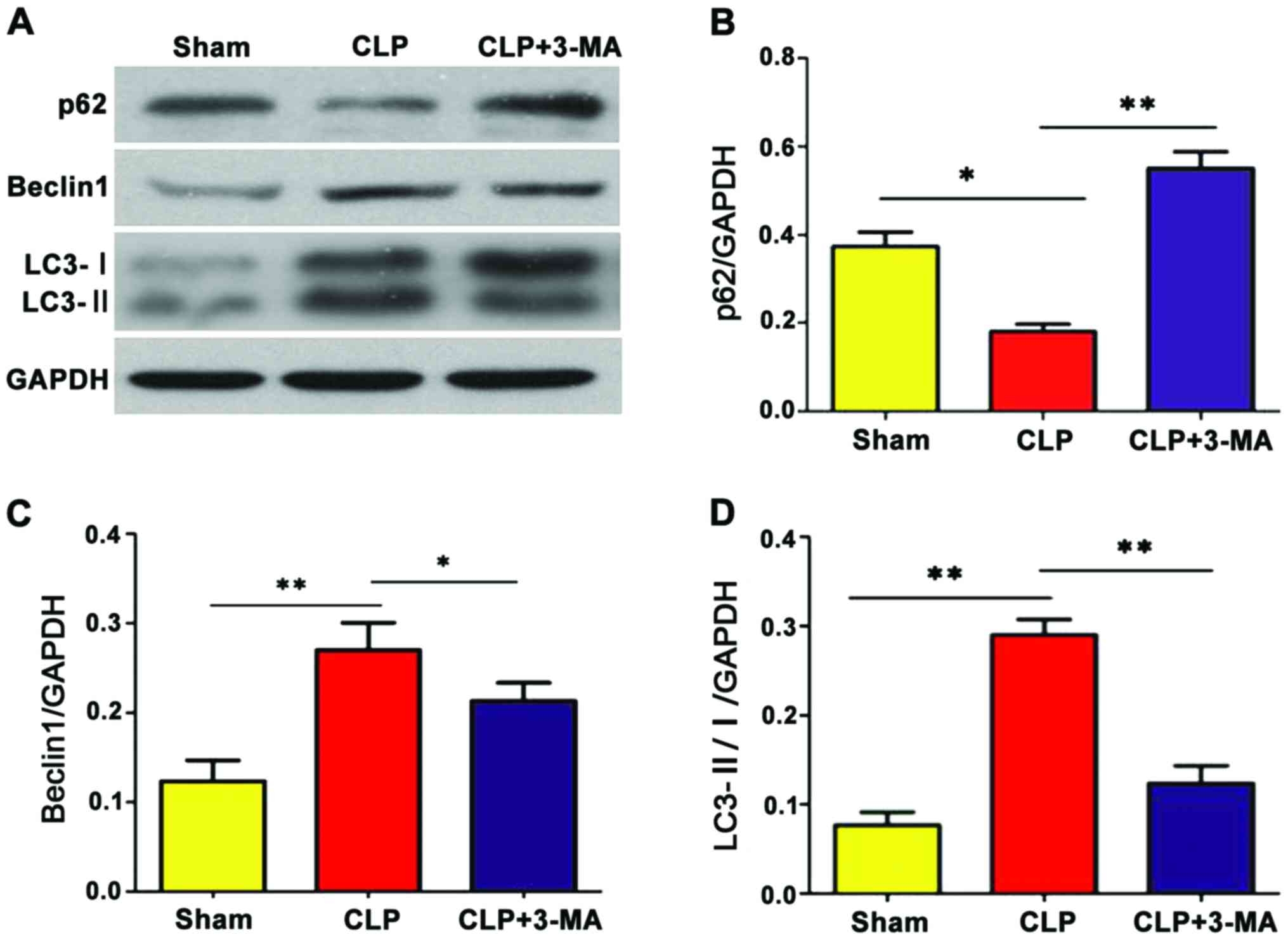|
1
|
Endo A, Okamura M, Yoshikawa S, Otomo Y
and Morio T: Multilateral functional alterations of human
neutrophils in sepsis: From the point of diagnosis to the seventh
day. Shock. 48:629–637. 2017. View Article : Google Scholar : PubMed/NCBI
|
|
2
|
Arulkumaran N, Sixma ML, Jentho E,
Ceravola E, Bass PS, Kellum JA, Unwin RJ, Tam FWK and Singer M:
Sequential analysis of a panel of biomarkers and pathologic
findings in a resuscitated rat model of sepsis and recovery. Crit
Care Med. 45:e821–e830. 2017. View Article : Google Scholar : PubMed/NCBI
|
|
3
|
Wang N, Mao L, Yang L, Zou J, Liu K, Liu
M, Zhang H, Xiao X and Wang K: Resveratrol protects against early
polymicrobial sepsis-induced acute kidney injury through inhibiting
endoplasmic reticulum stress-activated NF-κB pathway. Oncotarget.
8:36449–36461. 2017.PubMed/NCBI
|
|
4
|
Cai ZY, Sheng ZX and Yao H: Pachymic acid
ameliorates sepsis-induced acute kidney injury by suppressing
inflammation and activating the Nrf2/HO-1 pathway in rats. Eur Rev
Med Pharmacol Sci. 21:1924–1931. 2017.PubMed/NCBI
|
|
5
|
Martin-Loeches I, Muriel-Bombín A, Ferrer
R, Artigas A, Sole-Violan J, Lorente L, Andaluz-Ojeda D,
Prina-Mello A, Herrán-Monge R, Suberviola B, et al; GRECIA group, .
The protective association of endogenous immunoglobulins against
sepsis mortality is restricted to patients with moderate organ
failure. Ann Intensive Care. 7:442017. View Article : Google Scholar : PubMed/NCBI
|
|
6
|
Wollborn J, Schlegel N and Schick MA:
Phosphodiesterase 4 inhibition for treatment of endothelial barrier
and microcirculation disorders in sepsis. Anaesthesist. 66:347–352.
2017.(In German). View Article : Google Scholar : PubMed/NCBI
|
|
7
|
Thomas H: Sepsis: Bile acids promote
inflammation in cholestasis-associated sepsis. Nat Rev
Gastroenterol Hepatol. 14:324–325. 2017. View Article : Google Scholar : PubMed/NCBI
|
|
8
|
Sharma D, Farahbakhsh N, Shastri S and
Sharma P: Biomarkers for diagnosis of neonatal sepsis: A literature
review. J Matern Fetal Neonatal Med. 31:1646–1659. 2018. View Article : Google Scholar : PubMed/NCBI
|
|
9
|
Park SY, Shrestha S, Youn YJ, Kim JK, Kim
SY, Kim HJ, Park SH, Ahn WG, Kim S, Lee MG, et al: Autophagy primes
neutrophils for neutrophil extracellular trap formation during
sepsis. Am J Respir Crit Care Med. 196:577–589. 2017. View Article : Google Scholar : PubMed/NCBI
|
|
10
|
Crowell KT, Soybel DI and Lang CH:
Inability to replete white adipose tissue during recovery phase of
sepsis is associated with increased autophagy, apoptosis, and
proteasome activity. Am J Physiol Regul Integr Comp Physiol.
312:R388–R399. 2017. View Article : Google Scholar : PubMed/NCBI
|
|
11
|
Jin L, Batra S and Jeyaseelan S: Deletion
of Nlrp3 augments survival during polymicrobial sepsis by
decreasing autophagy and enhancing phagocytosis. J Immunol.
198:1253–1262. 2017. View Article : Google Scholar : PubMed/NCBI
|
|
12
|
Shi X, Yang F, Zheng YN, Zhang H, Wang XX,
Shao GJ and Lai XL: Metabolomic approach for the identification of
therapeutic targets of erythropoietin against sepsis in rat models.
Eur Rev Med Pharmacol Sci. 20:537–546. 2016.PubMed/NCBI
|
|
13
|
Deng M, Huang L, Ning B, Wang N, Zhang Q,
Zhu C and Fang Y: β-asarone improves learning and memory and
reduces acetyl cholinesterase and Beta-amyloid 42 levels in APP/PS1
transgenic mice by regulating Beclin-1-dependent autophagy. Brain
Res. 1652:188–194. 2016. View Article : Google Scholar : PubMed/NCBI
|
|
14
|
Salah FS, Ebbinghaus M, Muley VY, Zhou Z,
Al-Saadi KR, Pacyna-Gengelbach M, O'Sullivan GA, Betz H, König R,
Wang ZQ, et al: Tumor suppression in mice lacking GABARAP, an
Atg8/LC3 family member implicated in autophagy, is associated with
alterations in cytokine secretion and cell death. Cell Death Dis.
7:e22052016. View Article : Google Scholar : PubMed/NCBI
|
|
15
|
Zheng YH, Xiong B, Deng YY, Lai W, Zheng
SY, Bian HN, Liu ZA, Huang ZF, Sun CW, Li HH, et al: Effects of
allogeneic bone marrow mesenchymal stem cells on polarization of
peritoneal macrophages in rats with sepsis. Zhonghua Shao Shang Za
Zhi. 33:217–223. 2017.(In Chinese). PubMed/NCBI
|
|
16
|
Huan JN: Recognizing prevention and
treatment of burn sepsis with the concept of holistic integrative
medicine. Zhonghua Shao Shang Za Zhi. 33:196–199. 2017.(In
Chinese). PubMed/NCBI
|
|
17
|
Greninger AL and Hess JR: Clostridium
perfringens sepsis masquerading as a hemolytic transfusion
reaction. Transfusion. 57:11122017. View Article : Google Scholar : PubMed/NCBI
|
|
18
|
Macdonald SPJ, Bosio E, Neil C, Arendts G,
Burrows S, Smart L, Brown SGA and Fatovich DM: Resistin and NGAL
are associated with inflammatory response, endothelial activation
and clinical outcomes in sepsis. Inflamm Res. 66:611–619. 2017.
View Article : Google Scholar : PubMed/NCBI
|
|
19
|
Liu W, Guo J, Mu J, Tian L and Zhou D:
Rapamycin protects sepsis-induced cognitive impairment in mouse
hippocampus by enhancing autophagy. Cell Mol Neurobiol.
37:1195–1205. 2017. View Article : Google Scholar : PubMed/NCBI
|
|
20
|
Wan SX, Shi B, Lou XL, Liu JQ, Ma GG,
Liang DY and Ma S: Ghrelin protects small intestinal epithelium
against sepsis-induced injury by enhancing the autophagy of
intestinal epithelial cells. Biomed Pharmacother. 83:1315–1320.
2016. View Article : Google Scholar : PubMed/NCBI
|















